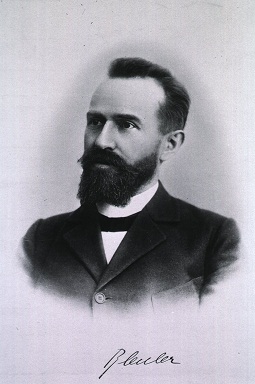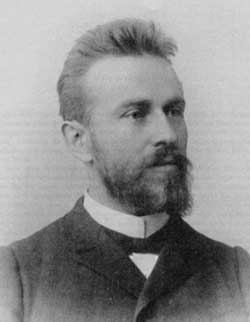<Back to Index>
- Psychiatrist Paul Eugen Bleuler, 1857
- Painter Francesco Primaticcio, 1504
- Anarchist and Historian Max Heinrich Hermann Reinhardt Nettlau, 1865
PAGE SPONSOR



Paul Eugen Bleuler (April 30, 1857 – July 15, 1939) was a Swiss psychiatrist most notable for his contributions to the understanding of mental illness and for coining the term "schizophrenia."
Bleuler was born in Zollikon, a small town near Zürich in Switzerland, to Johann Rudolf Bleuler, a wealthy farmer, and Pauline Bleuler - Bleuler. He studied medicine in Zürich and following his graduation in 1881 he worked as a medial assistant to Gottlieb Burckhardt at the Waldau Psychiatric Clinic in Bern. Leaving this post in 1884 he spent one year on medical study trips to Jean - Martin Charcot in Paris, to Bernhard von Gudden in Munich and to London. Thereafter he returned to Zürich to take a post as an intern at the Burghölzli, a university hospital.
In 1886 Bleuler became the director of a psychiatric clinic at Rheinau, a hospital located in an old monastery on an island in the Rhine. It was noted at the time for being backward, and Bleuler set about improving conditions for the patients resident there.
Bleuler returned to the Burghölzli in 1898 where he was appointed director.
Following his interest in hypnotism, especially in its "introspective" variant, Bleuler became interested in Sigmund Freud's work, favorably reviewing Josef Breuer and Sigmund Freud's Studies on Hysteria. Like Freud, Bleuler believed that complex mental processes could be unconscious. He encouraged his staff at the Burghölzli to study unconscious and psychotic mental phenomena. Influenced by Bleuler, Carl Jung and Franz Riklin used word association tests to integrate Freud's theory of repression with empirical psychological findings. As a series of letters demonstrates (published in English in 2003), Bleuler performed from 1905 a self - analysis with Sigmund Freud.
Bleuler is also recognized today for having a neurological condition called synesthesia, in which information from the sensory systems crosses over with the result that an individual experiences one sensation as another – tasting colours, hearing numbers or seeing music, for example.